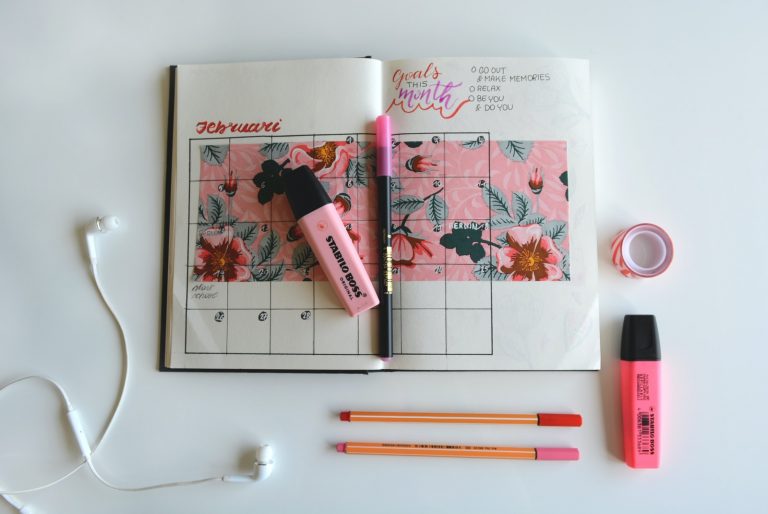Bullet journaling has become a popular way to track habits, goals, and daily tasks. A habit tracker is one of the most useful pages in a bullet journal, and it can help individuals build a better life by tracking their progress towards their goals. By tracking habits, individuals can turn them into lifelong habits and change them from something they are trying to do into a lifestyle change.
There are countless habits that can be tracked in a bullet journal, from drinking more water to reading for 30 minutes a day. The possibilities are endless, and it can be overwhelming to decide which habits to track. However, by choosing the right habits to track, individuals can make a significant impact on their lives. In this article, we will explore some of the best habits to track in a bullet journal and how they can help individuals achieve their goals and improve their lives.
Importance of Tracking Habits
Tracking habits is an essential part of building a better life. It helps individuals to keep track of their progress and stay accountable to their goals. Habits are the building blocks of our lives, and by tracking them, we can see where we need to improve and make adjustments accordingly.
Tracking habits in a bullet journal is an effective way to stay on top of your goals. Bullet journals are a popular method of habit tracking because they allow individuals to customise their tracking to suit their specific needs. They can include tables, bullet points, and other formatting options to make tracking habits more manageable.
One of the main benefits of tracking habits is that it helps individuals to build new habits easier. By deconstructing habits into manageable parts, individuals can see where they need to focus their efforts and make small changes to their routines. This can make it easier to build new habits and turn them into a lifestyle change.
Another benefit of tracking habits is that it helps individuals to stay motivated. Seeing progress in a habit tracker can be incredibly motivating and can encourage individuals to keep going, even when they face setbacks. It can also help individuals to identify patterns in their behaviour and make adjustments accordingly.
In conclusion, tracking habits is an important part of building a better life. It helps individuals to stay accountable to their goals, build new habits, stay motivated, and make adjustments to their routines. By using a bullet journal to track habits, individuals can customise their tracking to suit their specific needs and make habit tracking more manageable.
Habits to Track for Personal Growth
Keeping track of habits in a bullet journal is an effective way to achieve personal growth. By tracking habits, individuals can identify areas in their lives that require improvement and work towards achieving their goals. Here are some habits to track for personal growth:
Physical Health Habits
Physical health is essential to personal growth. By tracking physical health habits, individuals can maintain a healthy lifestyle and reduce the risk of developing health problems. Here are some physical health habits to track:
- Exercise: Regular exercise can help maintain physical health and improve overall well-being. Tracking exercise habits in a bullet journal can help individuals stay motivated and achieve their fitness goals.
- Nutrition: Maintaining a healthy diet is crucial to physical health. Tracking nutrition habits, such as eating fruits and vegetables, can help individuals make healthier food choices and achieve their nutritional goals.
- Sleep: Getting enough sleep is vital to physical health. Tracking sleep habits, such as the number of hours slept each night, can help individuals identify sleep patterns and make necessary adjustments to their sleep routine.

Mental Health Habits
Mental health is just as important as physical health. By tracking mental health habits, individuals can reduce stress and improve overall well-being. Here are some mental health habits to track:
- Meditation: Meditation can help reduce stress and improve mental clarity. Tracking meditation habits in a bullet journal can help individuals make meditation a regular part of their routine.
- Gratitude: Practicing gratitude can help improve mental well-being. Tracking gratitude habits, such as writing down things to be grateful for each day, can help individuals maintain a positive mindset and improve overall happiness.
- Mindfulness: Mindfulness can help individuals live in the present moment and reduce stress. Tracking mindfulness habits, such as taking breaks throughout the day to practice mindfulness, can help individuals incorporate mindfulness into their daily routine.
Personal Development Habits
Personal development is crucial to achieving personal growth. By tracking personal development habits, individuals can work towards achieving their goals and improving themselves. Here are some personal development habits to track:
- Learning: Continuous learning can help individuals improve their skills and knowledge. Tracking learning habits, such as reading a book or taking an online course, can help individuals make learning a regular part of their routine.
- Goal Setting: Setting goals can help individuals work towards achieving their dreams. Tracking goal setting habits, such as writing down goals and reviewing progress regularly, can help individuals stay motivated and achieve their goals.
- Self-Care: Taking care of oneself is essential to personal growth. Tracking self-care habits, such as taking breaks throughout the day to relax and unwind, can help individuals maintain a healthy work-life balance and improve overall well-being.
Tracking habits in a bullet journal can help individuals achieve personal growth. By tracking physical health habits, mental health habits, and personal development habits, individuals can identify areas for improvement and work towards achieving their goals.
Habits to Track for Professional Growth
Tracking habits for professional growth is a great way to achieve success in one’s career. By keeping track of certain habits, individuals can identify areas where they need to improve and take action to make positive changes. Here are some habits to track for professional growth:
Productivity Habits
Productivity is key to success in any career. Here are some habits to track to improve productivity:
| Habit | Description |
|---|---|
| Prioritising Tasks | Making a list of tasks and prioritising them based on importance and urgency |
| Time Management | Scheduling time for tasks and avoiding procrastination |
| Avoiding Distractions | Turning off notifications and minimising distractions to focus on work |
| Regular Breaks | Taking short breaks to rest and recharge to avoid burnout |
| Goal Setting | Setting clear goals and tracking progress towards them |
Learning and Development Habits
Continuous learning and development is essential for professional growth. Here are some habits to track to improve learning and development:
| Habit | Description |
|---|---|
| Reading | Reading books, articles, and other materials to increase knowledge and skills |
| Networking | Building relationships with colleagues and attending industry events to expand professional network |
| Skill Building | Taking courses, attending workshops, and participating in training programs to develop new skills |
| Seeking Feedback | Asking for feedback from colleagues and supervisors to identify areas for improvement |
| Reflecting | Taking time to reflect on experiences and learn from mistakes |
By tracking these habits, individuals can take control of their professional growth and work towards achieving their career goals.

Creative Habits to Track
Bullet journals are a great way to track creative habits and keep oneself accountable for practising them regularly. Here are some creative habits that one can track in their bullet journal to improve their artistic and writing skills.
Artistic Habits
Tracking artistic habits in a bullet journal can be a fun and engaging way to improve one’s artistic skills. Here are some artistic habits to track:
- Daily Sketches: Encourage oneself to draw or sketch something every day, even if it’s just a quick doodle.
- Colouring: Set a goal to colour a certain number of pages in a colouring book or to complete a specific colouring project.
- Art Journaling: Create an art journal and track the number of pages completed each week or month.
- Watercolour Practice: Set a goal to practice watercolour painting for a certain amount of time each day or week.
Writing Habits
Tracking writing habits in a bullet journal can help one to develop a regular writing practice and improve their writing skills. Here are some writing habits to track:
- Journaling: Set a goal to write in a journal every day or to complete a certain number of pages each week.
- Creative Writing: Track the number of words written each day or week for a creative writing project, such as a novel or short story.
- Poetry: Set a goal to write a certain number of poems each week or to complete a poetry collection within a certain timeframe.
- Writing Prompts: Track the number of writing prompts completed each day or week, and use them as inspiration for further writing practice.
Overall, tracking creative habits in a bullet journal can help one to develop a regular creative practice and improve their skills over time. By setting achievable goals and tracking progress, one can stay motivated and engaged in their creative pursuits.

How to Consistently Track Habits
Tracking habits in a bullet journal can be a great way to improve one’s life. However, it can be challenging to consistently track habits. Here are a few tips to help with that:
1. Start Small
It can be tempting to track many habits at once, but this can quickly become overwhelming. Instead, start with just a few habits. Once those habits become ingrained, add more.
2. Make It a Routine
Try to track habits at the same time every day. For example, track habits in the morning after waking up or at night before going to bed. This can help make tracking habits a routine and make it easier to remember.
3. Use a Habit Tracker
Using a habit tracker can make tracking habits easier and more efficient. There are many habit tracker templates available online, or one can create their own. Habit trackers can be in the form of tables, bullet points, or any other format that works best.
4. Be Accountable
Sharing habit tracking progress with someone else can help with accountability. This could be a friend, family member, or even an online community. Knowing that someone else is aware of the habit tracking progress can help with motivation and consistency.
5. Celebrate Progress
Tracking habits can be challenging, so it’s essential to celebrate progress. This could be as simple as putting a tick mark on the habit tracker or rewarding oneself after a certain number of days. Celebrating progress can help with motivation and make tracking habits more enjoyable.
By following these tips, consistently tracking habits in a bullet journal can become a routine and help lead to positive changes in one’s life.
Common Challenges and Solutions in Habit Tracking
When it comes to habit tracking, there are a few common challenges that people tend to face. Here are some of the most common challenges and solutions to help you overcome them:
Challenge: Missing a Day
One of the biggest challenges in habit tracking is missing a day. It’s easy to get discouraged when you break your streak or miss a day, but it’s important to remember that missing a day doesn’t mean you’ve failed.
Solution: Plan for Setbacks
To overcome this challenge, it’s important to plan for setbacks. Set realistic expectations and allow for some flexibility in your routine. If you do miss a day, don’t beat yourself up about it. Instead, focus on getting back on track the next day.
Challenge: Losing Motivation
Another challenge in habit tracking is losing motivation. It’s easy to get excited about a new habit at first, but over time, it can become difficult to stay motivated.
Solution: Mix it Up
To overcome this challenge, try mixing things up. Add new habits to your routine or change the way you track your progress. You could also try finding an accountability partner or joining a community of like-minded individuals to help keep you motivated.
Challenge: Overcommitting
One of the biggest mistakes people make when starting a habit tracking routine is overcommitting. It’s easy to get excited and want to track everything at once, but this can quickly become overwhelming.
Solution: Start Small
To avoid overcommitting, start small. Choose one or two habits to track at first and gradually add more over time. This will help you build momentum and avoid burnout.
Challenge: Not Seeing Results
Finally, a common challenge in habit tracking is not seeing results. It can be frustrating to put in the effort and not see any progress.
Solution: Be Patient
Remember that building new habits takes time. It’s important to be patient and stick with it, even if you’re not seeing immediate results. Celebrate small wins along the way and trust the process. Over time, you’ll start to see the benefits of your hard work.






